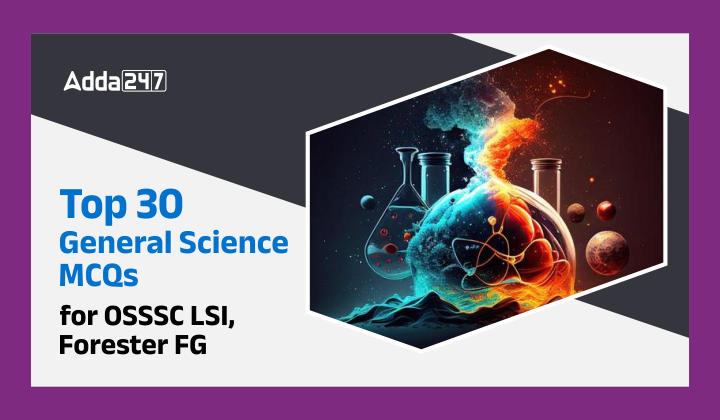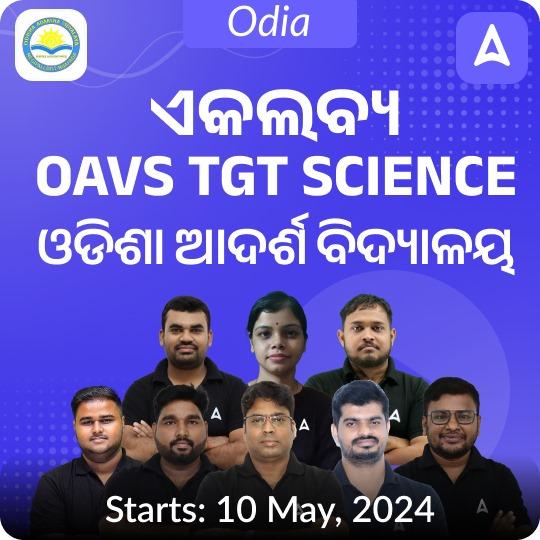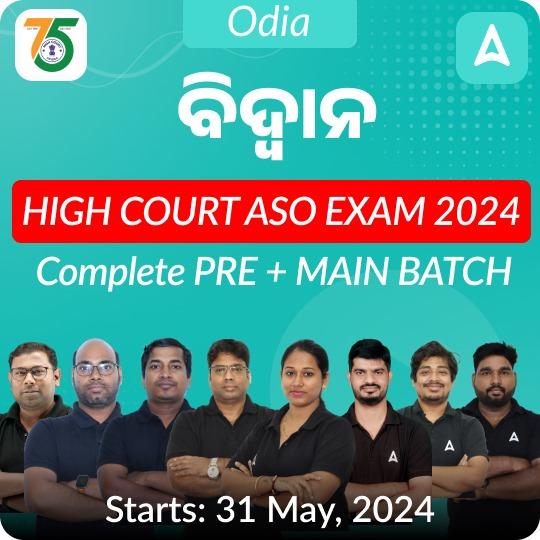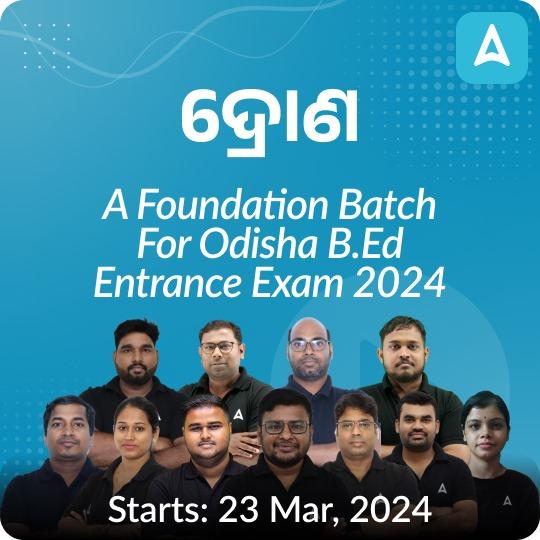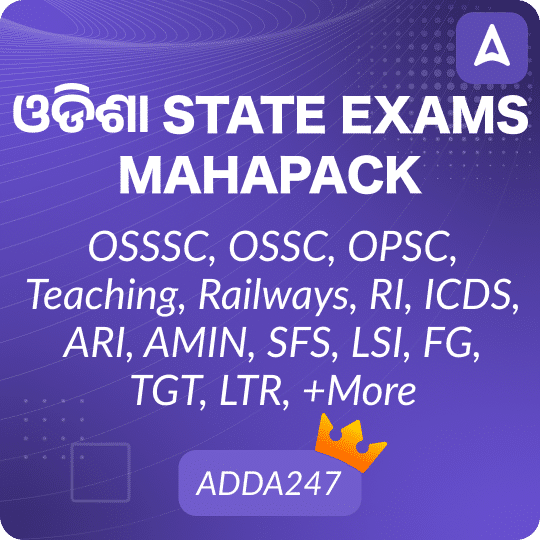General Science forms a crucial part of various competitive exams, including the OSSSC LSI (Livestock Supervisor Inspector) and Forester FG (Forest Guard) exams. Here, we present a curated list of 30 multiple-choice questions (MCQs) in General Science, covering diverse topics from physics, chemistry, biology, and environmental science. These questions are designed to test your understanding and application of scientific principles, making them suitable for candidates preparing for these examinations.
Top 30 General Science MCQs for OSSSC LSI, Forester, FG
Q1. What is the SI unit of power?
a) Watt
b) Joule
c) Newton
d) Pascal
Answer: a) Watt
Q2. What is the primary purpose of an anemometer?
a) Measuring water velocity
b) Measuring wind velocity
c) Measuring relative humidity
d) Measuring absolute humidity
Answer: b) Measuring wind velocity
Q3. What is the chemical formula of table salt?
a) NaCl
b) H2O
c) CO2
d) CaCO3
Answer: a) NaCl
Q4. Which of the following is NOT a primary function of the liver?
a) Metabolism
b) Digestion
c) Detoxification
d) Storage of bile
Answer: b) Digestion
Q5. Which gas is primarily responsible for global warming?
a) Oxygen
b) Nitrogen
c) Carbon dioxide
d) Hydrogen
Answer: c) Carbon dioxide
Q6. Which function of the liver involves the breakdown and elimination of toxins from the body?
a) Metabolism
b) Digestion
c) Detoxification
d) Storage of bile
Answer: c) Detoxification
Q7. Which term is derived from the Greek word “anemos” and is used to describe a device for measuring wind speed?
a) Hygrometer
b) Barometer
c) Anemometer
d) Thermometer
Answer: c) Anemometer
Q 8: In which field of study would an anemometer be most commonly used?
a) Oceanography
b) Botany
c) Meteorology
d) Geology
Answer: c) Meteorology
Q9. What type of force is responsible for keeping a vehicle moving in a circular path?
a) Centrifugal force
b) Centripetal force
c) Gravitational force
d) Frictional force
Answer: b) Centripetal force
Q 10: In which direction does the centripetal force act on a vehicle moving in a circular path?
a) Away from the center of the circle
b) Tangential to the circle
c) Towards the center of the circle
d) Parallel to the surface of the road
Answer: c) Towards the center of the circle
Q11: What happens if the centripetal force acting on a vehicle moving in a circular path is removed suddenly?
a) The vehicle continues moving in the circular path
b) The vehicle moves outward tangentially to the circle
c) The vehicle stops abruptly
d) The vehicle slows down gradually
Answer: b) The vehicle moves outward tangentially to the circle
Q12. Which type of waves are commonly used in night vision devices such as night vision goggles?
a) Microwaves
b) Infrared Waves
c) Ultraviolet Waves
d) Radio Waves
Answer: b) Infrared Waves
Q 13. What is the spectral range of infrared waves used in night vision devices?
a) 200–400 nm
b) 400–700 nm
c) 700–1,000 nm
d) 1,000–2,000 nm
Answer: c) 700–1,000 nm
Q 14: How does active infrared night vision work in night vision devices?
a) By amplifying visible light
b) By emitting infrared light and capturing the reflected light
c) By emitting ultraviolet light and capturing the reflected light
d) By emitting microwaves and cap
Q15. Why does a balloon filled with a gas such as hydrogen tend to rise up in the air?
a) Because the density of the gas is greater than the density of the air
b) Because the buoyant force exerted by the air on the balloon is less than the weight of the balloon
c) Because the buoyant force exerted by the air on the balloon is greater than the weight of the balloon
d) Because the balloon is lighter than the air surrounding it
Answer: c) Because the buoyant force exerted by the air on the balloon is greater than the weight of the balloon
Q16. What determines whether a balloon filled with gas will rise or fall in the air?
a) The color of the balloon
b) The shape of the balloon
c) The weight of the balloon
d) The relative density of the gas inside the balloon compared to the surrounding air
Answer: d) The relative density of the gas inside the balloon compared to the surrounding air
Q17. What happens to the buoyant force exerted on a balloon if it is filled with a gas denser than air?
a) It increases
b) It decreases
c) It remains the same
d) It depends on the size of the balloon
Answer: b) It decreases
Q18. What is the popularly known as Laughing Gas?
a) Nitric oxide
b) Nitrous oxide
c) Nitrogen penta oxide
d) Nitrogen
Answer: b) Nitrous oxide
Q19.Which of the following gases produces insensibility to pain and sometimes laughter when inhaled?
a) Nitric oxide
b) Nitrous oxide
c) Nitrogen penta oxide
d) Nitrogen
Answer: b) Nitrous oxide
Q20. Which compound is commonly used as an anesthetic during surgical procedures?
a) Chloroquine
b) Halothane
c) Chloramphenicol
d) Thyroxine
Answer: b) Halothane
Q21. What is the primary mode of administration of halothane during surgical procedures?
a) Oral ingestion
b) Intravenous injection
c) Inhalation
d) Topical application
Answer: c) Inhalation
Q22. Which of the following properties makes halothane suitable for use as an anesthetic during surgery?
a) Antimalarial activity
b) Antibiotic activity
c) Analgesic activity
d) Anxiolytic activity
Answer: c) Analgesic activity
Q23. Which type of glass is commonly used in the production of bulletproof screens?
a) Pyrex glass
b) Jena glass
c) Reinforced glass
d) Flint glass
Answer: c) Reinforced glass
Q24. What is another name for reinforced glass, which is often used in the manufacturing of bulletproof materials?
a) Laminated glass
b) Borosilicate glass
c) Safety glass
d) Crystal glass
Answer: c) Safety glass
Q25. Which property of reinforced glass makes it ideal for use in bulletproof screens?
a) High transparency
b) Low cost
c) High tensile strength
d) High thermal conductivity
Answer: c) High tensile strength
Q26. Which animal never drinks water in its entire life?
a. Kangaroo
b. Hippopotamus
c. Rat
d. Kangaroo rat
Answer: d. Kangaroo rat
Q27.What is the physical phase of life called?
a. Protoplasm
b. Cytoplasm
c. Organelles
d. None of the above
Answer: a. Protoplasm
Q28. Which cell is considered the largest in the human body?
a. Liver cell
b. Skin cell
c. Spleen cell
d. Ovum
Answer: d. Ovum
Q29. Which process involves the fusion of the ovum with a sperm cell?
a. Ovulation
b. Fertilization
c. Implantation
d. Menstruation
Answer: b. Fertilization
Q 30 . What is the term for a protective envelope or covering surrounding the egg cell?
a. Zygote
b. Blastula
c. Chorion
d. Follicle
Answer: c. Chorion


